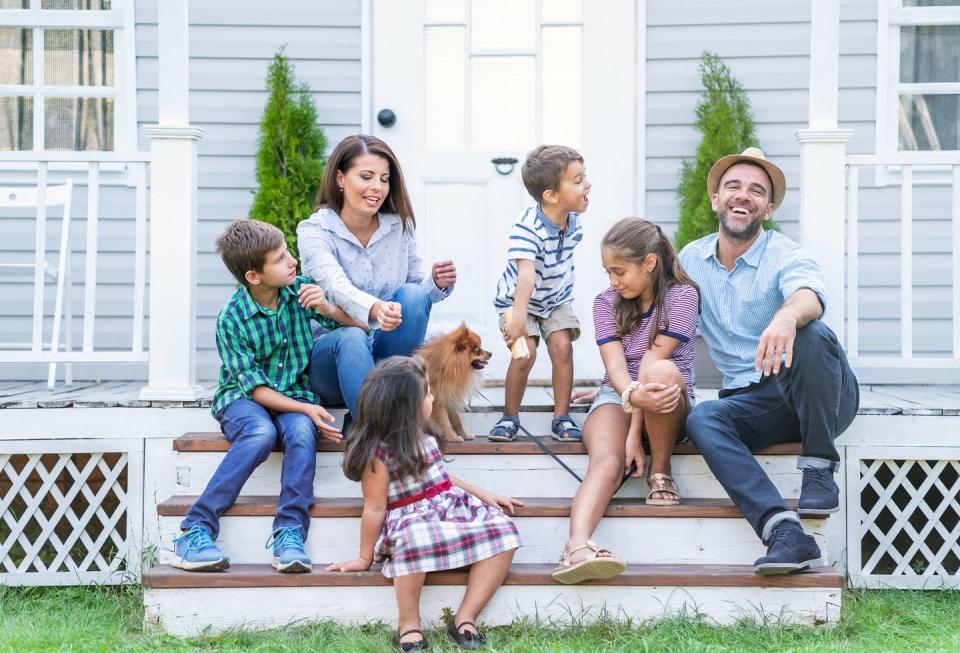The Scientific Reason Why Parents Constantly Mix Up Their Kids' Names

"Hearst Magazines and Yahoo may earn commission or revenue on some items through these links."
On any given frantic morning, as you’re wrangling the kids to get out of the house, you may sputter something like, “Jimmy, please get your backpack on. I mean Kaitlyn, Ugh, ALYSSA!”
While your kids may mock you for it, mixing up their names — even across genders — is extremely common, and no, you’re not losing your mind. In fact, it’s nothing to worry about.
Still, if you’re the one being called your brother’s name (even as an adult!) it might trigger negative thoughts and feelings — “Jimmy was always mom’s favorite,” or “I’m always forgotten because I’m the middle child.” But it’s nothing personal. Really. It’s simply a cognitive glitch, and there’s scientific evidence to prove it.
“When I was young, my mom would reel off this rapid-fire string of her kids’ names until she settled on the right one. Sometimes we would be called by the dog’s name too,” Samantha A. Deffler, Ph.D, associate professor of psychology at York College of Pennsylvania tells Good Houskeeeping. She's the lead author of a 2016 Duke University study on this misnaming phenomenon, which has recently seen resurgence after a TikTok discussing it went viral. “Across five studies, surveying over 1,700 participants, our research found that this is a natural and very common cognitive glitch. More than half of those surveyed had experienced being called by the wrong name by someone familiar to them, and 95% were called the incorrect name by a family member.”
Why do I get my kids names mixed up?
First, let’s dispel a concern for some: You’re not losing your marbles (well, this isn’t a sign, anyway), and you’re not experiencing memory loss or cognitive decline. In fact, your mind is more organized than you think.
“The brain is a magnificent computer network,” says Julie Dumas, Ph.D., associate professor of psychiatry at the University of Vermont, “and information is organized within an interconnected semantic network of stored data.”
The way the brain categorizes and retrieves information is similar to the folders on your laptop, and you have one for family names, another for friends and work colleagues, etc. “We found that naming errors typically happen within a category, so the wrong name being used is in the same group,” i.e., members of the family, says Deffler. “It would be weird for a mom to call her child by a name outside of that family category.” In Deffler’s research, pets are usually included in the family group, so screaming for Fido to put his dishes in the dishwasher instead of leaving them for you to clean up is par for the course.
What is the psychology behind misnaming?

The inability to keep your kids’ or pets’ names straight doesn’t mean you can’t tell them apart, and despite what Freud might have said, there’s no subconscious meaning behind it. It’s just a brain blip that happens in a split second.
Here’s why: Because calling out a loved one’s name is not something you have think about, the brain’s automatic processes take over. “When you’re rushed, stressed or multi-tasking, you rely on these automatic responses to spit out the information you need — in this case, your child’s name,” says Dumas. “For example, my son Emmett’s name is on speed dial in my brain, so I often call my husband and even our cat by that name if I’m racing around the house.”
Is mixing up names a sign of memory loss?
Calling your child by a sibling’s name is not a memory issue. “It’s neither due to forgetfulness nor aging. It’s more a sign of stress than of cognitive decline,” Dumas says. If you think back on the last time you mixed up names, it was probably when you were feeling overwhelmed and exhausted.
According to the Duke University study, almost half of the people surveyed said that the person doing the misnaming was distracted, tired or frustrated. It’s understandable to worry, especially when grandparents scramble family names, but this mix-up is typically not a symptom of anything more serious. “It becomes concerning when you don’t realize that you just did it, or if other people start noticing other significant memory problems,” adds Dumas. The early signs of dementia and Alzheimer’s include symptoms such as forgetting recently learned information or dates, and difficulty completing familiar tasks, according to The Alzheimer’s Association,
How to stop calling people by the wrong name
Being frazzled to your limit, and consequently mixing up kids’ names, is a pretty typical thing. “I just switched up my girls’ names a few hours ago!” says psychologist Amy Vigliotti, Ph.D., the Founding Head of SelfWorks in New York City, and the mother of two preschoolers. She uses a few quick tricks to slow down, focus, and get the naming right when she’s with her kids.
Take 5 deep breaths
Breathe in slowly through your nose, then exhale slowly. “This can reset your nervous system,” says Vigliotti.
Shake it out
“Having a minute of physical release is a really effective quick calming strategy.” If you can’t get away and take a walk around the block, then do some gentle neck and shoulder rolls, or a rag doll pose. “Use this minute to meditate, by imagining all the tension melting off of you like butter,” she says.
Use a stress-relieving mantra
If you tend to self-criticize when you make mistakes, try saying something like, ‘I’m just having a moment and it will pass.’ “This can prevent you from adding a layer of mom shame to the moment,” says Vigliotti.
It’s important to remember that calling your kids by each other’s names is normal. It’s not only natural, but it’s also likely to be passed down. “I worked on this study before I had kids,” says Deffler, “and now that I’m a mom, I make the same naming mistakes that my mother did.” It’s all in the family, after all.
You Might Also Like

